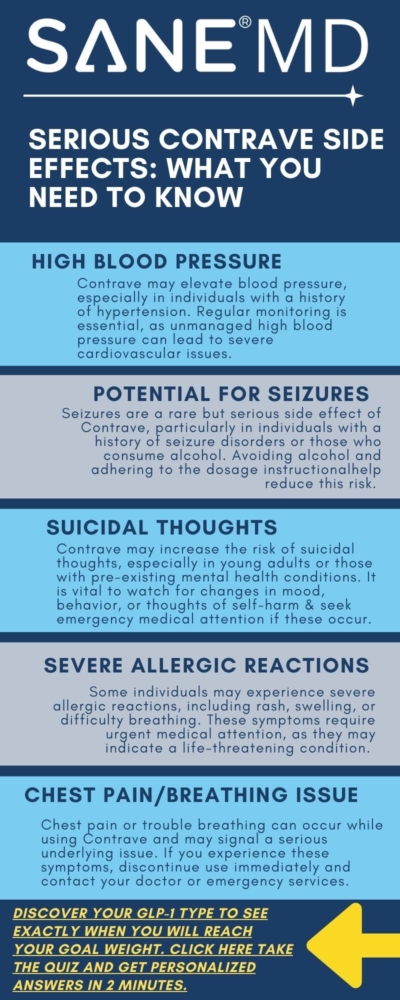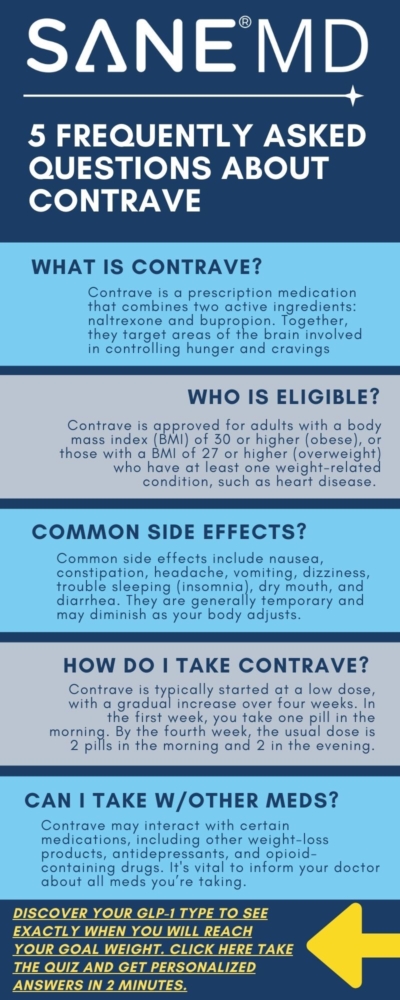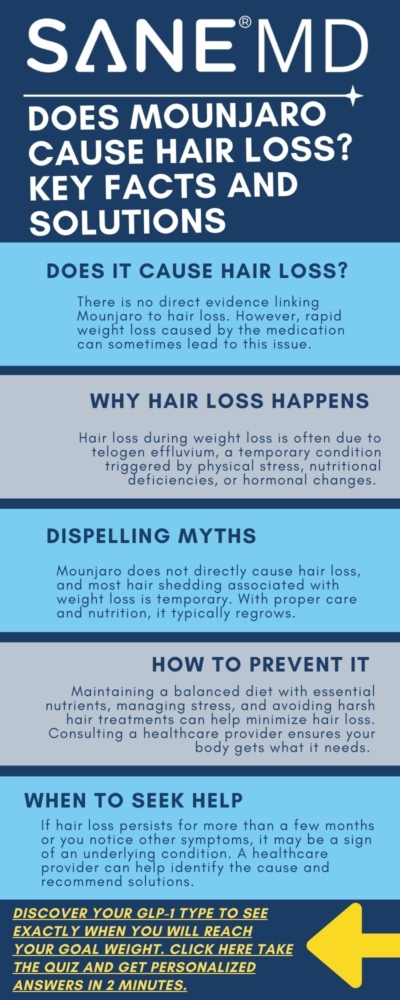Contrave Side Effects
Contrave is a prescription medication used for weight loss and weight management in adults. It combines two medicines, naltrexone and bupropion (consider our article on Contrave and Depression if this may be you), which work together to help reduce hunger and increase feelings of fullness. While Contrave can be an effective tool for weight loss, it can also cause side effects, some of which can be serious. In this article, we will discuss the common Contrave side effects, how to manage them, and special precautions to take when using this medication considering how long Contrave can stay in your system and why exactly this medication works.
Key Takeaways
- Effective Weight Management Aid: Contrave combines naltrexone and bupropion to help reduce cravings and support long-term weight loss when paired with diet and exercise.
- Mild to Serious Side Effects: Common side effects like nausea and headaches often subside over time, but serious risks, including suicidal thoughts, require close monitoring.
- Important Precautions: Avoid alcohol, high-fat meals, and certain medications while on Contrave, and consult your doctor regularly to ensure safe and effective use.
What Does Contrave Do for Weight Loss?
Contrave’s active ingredients, naltrexone and bupropion, work on the brain’s reward system and appetite regulation. This combination helps reduce food cravings and supports long-term weight management for compatible individuals.
In clinical trials, patients taking Contrave experienced significant reductions in body weight compared to those in the placebo group.
Common Side Effects of Contrave
Most individuals tolerate Contrave well, but it may cause common side effects, including:
- Nausea
- Dry mouth
- Trouble sleeping
- Headache
- Dizziness
- Constipation
These symptoms are typically mild and may subside as your body adjusts to the medication. However, if symptoms persist, consult your healthcare provider. For an in-depth look at why Contrave may cause constipation and tips for managing it, read our article on Contrave Constipation.
Table of Common Contrave Side Effects
| Side Effect | Description | Frequency/Notes |
|---|---|---|
| Nausea | Feeling queasy or an upset stomach | Common; may diminish after the first few weeks |
| Dry Mouth | Persistent dryness or thirst | Typically mild and manageable with hydration |
| Trouble Sleeping | Difficulty falling or staying asleep | Often temporary; improve sleep hygiene |
| Headache | Mild to moderate pain in the head | Can be managed with hydration and rest |
| Dizziness | Feeling lightheaded or unsteady | Sit or lie down if symptoms occur |
| Constipation | Difficulty with bowel movements | Increase fiber and fluid intake |
Serious Contrave Side Effects
While rare, some users may experience serious side effects requiring immediate medical attention. These include:
- High blood pressure
- Chest pain
- Trouble breathing
- Seizures
- Serious allergic reaction (e.g., rash, swelling, difficulty breathing)
- Suicidal thoughts or changes in behavior, particularly in young adults
If you notice any of these symptoms, contact your doctor immediately or call your local emergency number.
Managing Side Effects
Most side effects of Contrave are mild and temporary, but some can be serious. If you experience any side effects, it is essential to talk to your doctor.
Here are some tips for managing common side effects:
- Nausea: Take Contrave with a meal to reduce nausea. Avoid taking it with high-fat meals, as this can increase side effects.
- Constipation: Increase fiber intake and stay hydrated to help alleviate constipation.
- Headache: Manage headaches with hydration, a consistent sleep schedule, and regular exercise.
- Dizziness: Move slowly and sit down if you feel dizzy to prevent falling.
- Trouble sleeping: Practice good sleep hygiene, such as following a regular sleep schedule and creating a sleep-conducive environment.
Boxed Warning for Contrave
The Food and Drug Administration (FDA) has issued a boxed warning for Contrave due to the risk of suicidal thoughts and behaviors, particularly in individuals with a history of mental health conditions or bipolar disorder.
Regular monitoring by a healthcare provider is recommended for patients starting Contrave.
Special Precautions
Before taking Contrave, it is essential to discuss your medical history with your doctor.
Certain medical conditions, such as high blood pressure, heart problems, seizures, glaucoma, diabetes, liver or kidney problems, or a history of an allergic reaction to Contrave or its ingredients, may require special precautions or contraindicate the use of Contrave.
- High blood pressure: Contrave may increase blood pressure, so it is essential to monitor blood pressure regularly.
- Low blood sugar: Contrave may increase the risk of hypoglycemia (low blood sugar) in patients with diabetes.
- Allergic reactions: Contrave can cause serious allergic reactions, including anaphylaxis, which can be life-threatening.
- Suicidal thoughts: Contrave may increase the risk of suicidal thoughts and behaviors, especially in children and young adults.
- Mental health conditions: Contrave may not be suitable for people with certain mental health conditions, such as bipolar disorder or eating disorders.
Stopping or Missing Doses
If you need to stop taking Contrave, it is essential to talk to your doctor first. Stopping Contrave suddenly can cause withdrawal symptoms, although this is rare.
If you miss a dose, take it as soon as you remember, but do not take two doses at the same time.
Pregnancy and Breastfeeding
Contrave is not recommended during pregnancy or breastfeeding.
Weight loss during pregnancy may cause fetal harm, and Contrave can pass into breast milk and cause harm to a child.
Long-term Effects
The long-term effects of Contrave are not well understood. However, it is essential to monitor side effects and adjust the dosage or discontinue treatment if necessary. Regular monitoring of blood pressure, liver function, and kidney function is recommended.
In conclusion, while Contrave can be an effective tool for weight loss in certain individuals, it is essential to be aware of the potential side effects and take special precautions to manage them.
By discussing your medical history with your doctor and following the recommended dosage and monitoring schedule, you can minimize the risk of side effects and achieve successful weight loss.
Who Should Avoid Taking Contrave?
Contrave is not suitable for everyone. Avoid taking Contrave if you:
- Have uncontrolled high blood pressure
- Are pregnant or breastfeeding (due to potential fetal harm or transfer through breast milk)
- Have a history of seizure disorder
- Are currently taking monoamine oxidase inhibitors
- Have a history of opioid withdrawal or are using opioids
- Have angle-closure glaucoma
What to Avoid While on Contrave
To minimize side effects and enhance effectiveness, avoid:
- Drinking alcohol, as it may increase the risk of seizures and other adverse effects.
- High-fat meals, which can elevate blood levels of the medication and lead to nausea.
- Using other drugs or medications without consulting your healthcare provider.
How Long Do Contrave Side Effects Last?
The duration of side effects varies depending on the individual. Common symptoms such as nausea and dry mouth may subside within a few weeks as the body adjusts.
However, more severe side effects may require discontinuation of the medication and further evaluation by a healthcare provider. For a detailed exploration of how and when side effects typically resolve, read our guide, Do Side Effects of Contrave Go Away.
Potential Drug Interactions
Contrave may interact with other medications, including:
- Antidepressants
- Blood pressure medications
- Seizure medications
- Opioids
As you can see, many types of drugs can interact with Contrave. Phentermine is one of them. In taking Contrave and Phentermine together, drug interactions are prevalent and can be serious. Taking Contrave and Topamax together without medical supervision can also cause serious drug interactions.
Always keep your healthcare provider updated on your medical history and any medications you are currently using to prevent potential drug interactions.
Clinical Trials and Effectiveness
In clinical trials, patients using Contrave in conjunction with a reduced-calorie diet and exercise achieved significant weight loss compared to those in the placebo group.
These results highlight the importance of combining medication with lifestyle changes for optimal outcomes.
FAQs About Contrave Side Effects
When considering a weight loss treatment like Contrave, it’s natural to have questions about its safety, effectiveness, and potential side effects. Understanding how Contrave works and how to manage its possible downsides can help you make informed decisions about whether it’s the right choice for your weight management journey.
Below, we’ve compiled answers to some of the most frequently asked questions about the Contrave side effects to guide you further.
What Is the Downside of Contrave?
Contrave has several potential downsides, primarily related to its side effects. Some typical side effects may include feelings of nausea, constipation, dryness in the mouth, dizziness, and difficulties with sleep. For some individuals, these symptoms can be mild and resolve over time, while others may find them disruptive.
Additionally, Contrave carries a risk of more serious side effects, such as increased blood pressure or heart rate and, in rare cases, suicidal thoughts or behavior. Due to these risks, close monitoring by a healthcare provider is essential, particularly during the initial weeks of treatment.
How Long Do Contrave Side Effects Last?
The duration of Contrave side effects varies by individual. Common symptoms like nausea, headache, or dry mouth often diminish within the first few weeks as the body adjusts to the medication. However, more persistent or severe symptoms, such as significant mood changes or elevated blood pressure, may require medical intervention.
If side effects last longer than expected or interfere with daily life, consult your healthcare provider for personalized advice or adjustments to your treatment plan.
How Much Weight Do You Lose With Contrave?
Weight loss results with Contrave can vary significantly depending on factors like adherence to lifestyle changes and individual metabolism. In clinical studies, patients using Contrave in combination with a reduced-calorie diet and regular exercise experienced an average weight loss of 5-10% of their starting weight over 6 to 12 months. Some individuals may achieve greater reductions, especially when following a comprehensive weight management program.
It’s important to note that weight loss progress is gradual, and maintaining healthy habits is key to sustaining results.
What to Avoid While on Contrave?
Certain activities and substances should be avoided while taking Contrave to ensure safety and efficacy.
These include:
- Alcohol Consumption: Drinking alcohol can increase the risk of adverse side effects, such as dizziness or mood changes, and may interfere with weight loss efforts.
- High-Fat Meals: High-fat meals can increase the risk of nausea and other gastrointestinal symptoms when taken with Contrave.
- Certain Medications: Avoid taking other prescription or over-the-counter medications, particularly those that affect the central nervous system or appetite, without consulting your doctor.
- Operating Heavy Machinery: Until you know how Contrave affects you, avoid driving or using heavy machinery, as it can cause dizziness or impaired alertness.
Always discuss any concerns or lifestyle adjustments with your healthcare provider to optimize your treatment experience.
Conclusion
Contrave is a valuable tool for weight management in certain individuals with obesity or weight-related conditions. By understanding and managing the side effects of Contrave, patients can safely incorporate it into their weight loss program.
Always consult a healthcare provider for personalized advice and monitoring.
For additional information, visit the FDA’s page on Contrave (opens in a new tab) or explore resources from trusted organizations like Mayo Clinic
Is Contrave the Right Fit for Your Weight Loss Journey?
Is Contrave the right fit for your weight loss journey? Read on to discover personalized insights.
Weight loss journeys are often challenging, requiring not just lifestyle adjustments but also personalized approaches to achieve meaningful results. Contrave, a prescription weight loss medication, combines two active ingredients—naltrexone and bupropion—that work together to address appetite control and food cravings.
This unique formulation, known as Contrave naltrexone, supports individuals seeking to manage their weight effectively when combined with diet and exercise. The combination of naltrexone bupropion in Contrave is specifically designed to help with weight management by reducing hunger and controlling cravings.
To help determine if Contrave might be a good fit, the weight loss drug type quiz is an excellent resource. By evaluating your weight loss history and goals, the Contrave quiz offers insights into personalized weight loss options,
Key Takeaways
- Contrave targets brain areas controlling hunger and fullness, aiding weight loss.
- It is suitable for adults with obesity or overweight-related health conditions.
- Consider taking the weight loss drug type quiz to explore personalized options.
What is Contrave (Naltrexone Bupropion) and How Does it Work?
Contrave is a combination medication designed specifically to assist in weight management. It merges naltrexone, a drug that influences reward pathways in the brain, and bupropion, which affects mood and appetite. Together, these components help regulate eating behaviors and cravings.
Contrave works by targeting two critical areas of the brain:
- Hunger centers that influence your desire to eat.
- Reward centers that drive cravings for unhealthy foods.
By addressing these areas, Contrave reduces hunger and enhances feelings of fullness, making it easier for individuals to maintain a calorie deficit and stick to healthier eating habits. However, there is an increased risk of side effects when not following dietary guidelines.
It is important to monitor conditions such as high blood pressure while taking Contrave.
Benefits of Contrave for Weight Loss
If you’ve been wondering if Contrave can help you lose weight, research shows that this medication offers several advantages for individuals struggling with weight management:
- Clinically proven weight loss: Studies show an average weight loss of 4–8% of body weight over 12 months with consistent use.
- Improved blood sugar control: Contrave can help regulate blood sugar levels, potentially lowering the risk of type 2 diabetes.
- Flexible options: It can be integrated into broader weight loss strategies, including therapy, structured exercise programs, or even additional medications, under medical supervision.
Additionally, losing weight with Contrave can lead to improved health outcomes, such as better cardiovascular health and reduced risk of obesity-related conditions.
These benefits make Contrave a viable option for individuals who require medical support to achieve sustainable weight loss.
Reduced Calorie Diet and Lifestyle Changes
When taking Contrave, it’s essential to follow a reduced-calorie diet and make lifestyle changes to achieve and maintain weight loss. A reduced-calorie diet means consuming fewer calories than your body burns, resulting in weight loss. This can be achieved by eating smaller portions, avoiding high-calorie foods, and increasing physical activity.
Lifestyle changes, such as regular exercise, stress management, and getting enough sleep, can also help support weight loss. Exercise, in particular, can help you lose weight and maintain weight loss over time. Strive for at least 150 minutes of moderate-intensity aerobic exercise or 75 minutes of vigorous-intensity aerobic activity each week, or a combination of both.
Additionally, incorporating strength training exercises into your routine can help build muscle mass, which can further support weight loss. It’s also important to get enough sleep, as sleep deprivation can disrupt hormones that regulate hunger and fullness, leading to overeating and weight gain.
Is Contrave a Good Fit for Your Weight Loss Journey: Who is a Good Candidate for Contrave?
For those asking ‘Is Contrave right for You,’ below are some specific criteria for eligibility:
- BMI thresholds: A body mass index (BMI) of 30 or higher qualifies individuals for the medication. Individuals with a BMI of 27 or higher may also be eligible if they have health concerns related to their weight, such as high blood pressure, type 2 diabetes, or elevated cholesterol levels.
- Previous weight loss attempts: Contrave is ideal for individuals who have tried diet and exercise but have not seen meaningful results.
- Commitment to lifestyle changes: The medication is most effective when paired with consistent dietary adjustments and physical activity.
- Bipolar disorder: Individuals with a personal or family history of bipolar disorder should be monitored closely while taking Contrave due to the risk of experiencing manic episodes.
For personalized guidance, taking the weight loss drug type quiz can help identify whether Contrave aligns with your health and weight loss goals.
What to Expect When Starting Contrave
Starting Contrave involves following a structured dosing schedule. This ensures the body gradually adjusts to the medication, reducing the risk of side effects.
- Gradual dose increase: Begin with a lower dose, typically one tablet daily, and increase over time as advised by your healthcare provider.
- Timeline for results: It may take several weeks to notice significant changes in weight, as the medication supports gradual, sustainable loss.
- Lifestyle changes: Pairing Contrave with a calorie-reduced diet and regular physical activity is essential to achieving desired outcomes.
- Regular monitoring: Routine follow-ups with a healthcare provider are necessary to track progress and ensure safe use.
- Missed dose: If you miss a dose of Contrave, skip the missed dose and continue with your regular schedule. Do not double up on doses. Using medication reminders like alarms or reminder apps can help prevent missed doses.
Side Effects and Warnings: High Blood Pressure
Like all medications, Contrave has potential side effects.
Common side effects include:
- Nausea
- Headache
- Dry mouth
These symptoms often subside as the body adjusts to the medication.
Serious side effects to watch for include:
- Suicidal thoughts or mood changes
- Seizures
- Increased blood pressure
- Skin rash
- Skin reactions
If you experience any severe symptoms, seek immediate medical attention. Individuals should always discuss potential risks with their healthcare provider before starting Contrave.
It is important to be aware of the potential for an allergic reaction or allergic reactions. Symptoms to watch for include itching, swelling, dizziness, and trouble breathing. If you notice any of these symptoms, stop taking the medication and seek immediate medical help.
Serious skin reactions to watch for include:
- Blistering
- Peeling skin
If you experience any of these symptoms, seek immediate medical attention.
FDA Warning: Risk of Suicidal Thoughts and Behaviors
Contrave has a boxed warning from the FDA for the risk of suicidal thoughts and behaviors. This risk is higher in children, teenagers, and young adults (up to age 24 years), especially during the first few months of treatment or when the dose is adjusted.
If you’re taking Contrave, it’s essential to pay close attention to any unusual changes in your mood, behaviors, thoughts, or feelings. Loved ones, caregivers, and healthcare professionals should also watch for such changes. If you experience any of the following symptoms, seek medical attention immediately:
- Suicidal thoughts or behaviors
- Agitation or aggression
- Irritability or mood swings
- Anxiety or panic attacks
- Insomnia or sleep disturbances
- Increased heart rate or blood pressure
Who Should Not Take Contrave?
Certain individuals should avoid Contrave due to specific health risks:
- History of seizures: The medication increases the risk of seizure activity.
- Eating disorders or opioid use: Contrave can have adverse interactions with these conditions.
- Pregnancy and breastfeeding: Contrave may harm unborn babies or pass into breast milk.
- Chest pain: Seek immediate medical attention if you experience chest pain, as it could indicate a serious allergic reaction to the medication.
Always consult a healthcare provider to determine whether Contrave is safe for your specific circumstances.
How to Take Contrave
To maximize safety and effectiveness:
- Take Contrave twice daily, once in the morning and once in the evening.
- Avoid taking the medication with high-fat meals, which may increase the risk of seizures.
- Swallow tablets whole—do not chew, crush, or split them.
- Consuming Contrave with a high-fat meal can lead to increased exposure to its active ingredients, bupropion and naltrexone, raising the risk of side effects, including seizures.
Following these guidelines ensures the medication works as intended and minimizes risks.
Interactions with Other Medications
Contrave may interact with certain drugs, which can increase the risk of adverse effects:
- MAO inhibitors: Combining these drugs with Contrave can lead to dangerous side effects.
- Other prescription and over-the-counter medications, vitamins, or supplements should also be disclosed to your healthcare provider.
- Low blood sugar: Individuals with Type 2 diabetes using medications like insulin or glipizide should monitor their blood sugar levels regularly to recognize symptoms of low blood sugar and adjust medication dosages to mitigate the risk of hypoglycemia while undergoing treatment with Contrave (naltrexone/bupropion).
Providing a complete list of your medications ensures safe and effective treatment.
Stopping Contrave
Never stop taking Contrave abruptly. Doing so can lead to withdrawal symptoms or a sudden resurgence of appetite. Instead:
- Work with your healthcare provider to develop a tapering plan if discontinuation is necessary.
- Regular check-ins during this process can help manage any side effects or challenges.
Monitoring and Follow-Up
Ongoing monitoring is critical for safe and effective use of Contrave:
- Regularly check blood pressure, blood sugar levels, and liver function.
- Attend follow-up appointments to evaluate progress and adjust treatment plans as needed.
How Long Does it Take to Work?
Contrave can start working within a few weeks of taking the medication, but it may take several months to achieve significant weight loss. In clinical studies, the most dramatic weight loss was typically seen after 4 months (16 weeks) of taking Contrave as prescribed.
It’s essential to remember that weight loss is a gradual process, and it may take time to achieve your goals. Stick to your treatment plan, and don’t get discouraged if you don’t see immediate results. With Contrave and a reduced calorie diet, you can achieve and maintain weight loss over time.
Financial and Insurance Assistance
Managing the cost of Contrave can be easier with available resources:
- The manufacturer, Currax Pharmaceuticals LLC, offers financial assistance programs to lower out-of-pocket expenses.
- Consult with your insurance provider to gain a clear understanding of coverage options and copay details.
Alternatives to Contrave
If Contrave is not suitable for you, there are alternative weight loss medications available. Some examples include:
- Qsymia (phentermine and topiramate)
- Saxenda (liraglutide)
- Belviq (lorcaserin)
- Orlistat (Xenical)
It’s essential to talk to your healthcare provider about your options and determine which medication is best for you. They can help you weigh the benefits and risks of each medication and make an informed decision.
Remember, weight loss medications should always be used in conjunction with a reduced-calorie diet and lifestyle changes. With the right treatment plan, you can achieve and maintain weight loss over time.
The Role of the Weight Loss Drug Type Quiz
The weight loss drug type quiz is a practical resource for individuals exploring their options. By considering factors like weight loss history, weight goals, and lifestyle, the quiz provides personalized insights into whether Contrave—or another medication—might be a good fit.
FAQ Section: Everything You Need to Know About Contrave
This FAQ section addresses common questions about Contrave to help you make informed decisions about your weight loss journey. Whether you’re just starting or considering your options, these answers offer clarity and support.
1. How long does it take to see results with Contrave?
Weight loss with Contrave is gradual and sustainable. Most individuals begin noticing changes within a few weeks, but significant weight loss typically occurs over 12–16 weeks.
Consistency with diet, exercise, and medication is key to achieving the best outcomes.
2. Can Contrave be combined with other weight loss methods?
Contrave works well alongside a reduced-calorie diet and regular physical activity.
In some cases, healthcare providers may recommend additional therapies or counseling to enhance weight management strategies.
3. What are the most common side effects of Contrave?
Nausea, headache, and dry mouth are frequently reported Contrave side effects. These are often temporary and diminish as your body adjusts to the medication.
If symptoms persist or worsen, consult your healthcare provider.
4. What should I do if I miss a dose of Contrave?
If you miss a dose of Contrave, skip it and continue with your regular schedule.
Avoid taking extra doses to compensate, as this increases the risk of side effects, including seizures.
5. How does Contrave compare to other weight loss medications?
Contrave differs in its dual-action mechanism, targeting both appetite and cravings.
While some medications focus solely on hunger suppression or metabolic effects, Contrave’s approach may suit individuals needing support with emotional eating.
Conclusion
Contrave offers a tailored approach to weight loss by addressing both appetite and cravings. It is most effective when combined with a reduced-calorie diet, exercise, and consistent medical monitoring. Always consult your healthcare provider before starting or modifying any treatment plan.
Does Mounjaro Cause Hair Loss? Exploring the Side Effects
Mounjaro, a newer addition to the growing list of weight loss drugs, has gained attention as an injectable medication that promotes weight loss in a subset of individuals with obesity and related conditions. However, as with many weight loss medications, questions like “Does Mounjaro cause hair loss” arise.
This article explores the connection between Mounjaro and hair loss, examining clinical evidence, potential causes, and ways to mitigate this concern.
Key Takeaways
- While there is no direct evidence linking Mounjaro to hair loss, rapid weight loss associated with its use may trigger conditions like telogen effluvium, leading to temporary hair thinning.
- Nutritional deficiencies, hormonal changes, and emotional stress during significant weight loss can contribute to hair shedding.
- Maintaining a balanced diet and consulting a healthcare provider can help prevent and manage potential hair loss while using weight loss medications like Mounjaro.
Understanding Mounjaro and Its Mechanism
Mounjaro belongs to a class of receptor agonists designed to aid weight loss by regulating blood sugar levels and decreasing appetite.
Initially approved for managing type 2 diabetes, Mounjaro’s ability to promote weight loss has led to its off-label use in compatible individuals looking to lose weight. So. Mounjaro is used for both blood sugar management and weight loss.
Common Side Effects of Mounjaro
Like other weight loss medications, Mounjaro comes with a range of common side effects:
- Stomach pain: A frequent complaint, often related to the medication’s effect on digestion.
- Decreased appetite: An expected effect given its mechanism.
- Low blood sugar: Especially when combined with other medications like insulin.
- Nausea and vomiting: Common side effects that tend to diminish over time.
These effects are generally manageable, but other potential adverse effects, including hair loss, require closer examination.
Does Mounjaro Cause Hair Loss? Myth vs. Reality
| Concern | Myth | Reality |
|---|---|---|
| Mounjaro directly causes hair loss | Mounjaro itself is responsible for hair thinning. | No clinical evidence links Mounjaro directly to hair loss. Hair shedding is more likely caused by rapid weight loss or nutritional deficiencies. |
| Hair loss from weight loss medications is permanent | Once hair is lost, it won’t grow back. | Hair loss due to telogen effluvium or rapid weight loss is usually temporary, with regrowth occurring in 6–9 months once the body adjusts. |
| All users of Mounjaro experience hair loss | Hair loss is a guaranteed side effect of Mounjaro. | Not everyone experiences hair loss. Individual factors like diet, genetics, and stress levels play significant roles. |
| Nutritional deficiencies are unavoidable | Using weight loss medications means you can’t avoid deficiencies that lead to hair thinning. | A balanced diet rich in nutrients like iron, zinc, and biotin, combined with supplements if needed, can prevent most deficiencies and support hair health. |
| Stress from weight loss doesn’t affect hair | Emotional and physical stress during weight loss have no impact on hair. | Stress, including that from rapid weight loss, can trigger telogen effluvium, a temporary condition causing more hair follicles to enter the resting phase. |
Does Mounjaro Cause Hair Loss?
Examining the Evidence
Currently, there is no direct evidence from clinical trials or studies conclusively linking hair loss as a side effect of Mounjaro. However, anecdotal reports and a theoretical understanding of hair shedding during significant weight loss suggest a potential connection.
Hair loss, particularly temporary hair thinning, can occur when the body undergoes physiological stress, such as rapid weight loss.
Telogen Effluvium and Weight Loss
One explanation for hair loss during a weight loss journey is telogen effluvium, a condition where more hair follicles enter the resting phase of the hair growth cycle. This condition is typically triggered by significant physical or emotional stress, including rapid weight loss.
It’s worth noting that telogen effluvium usually resolves within a few months, allowing hair regrowth to occur.
The Connection Between Rapid Weight Loss and Hair Shedding
Rapid weight loss, often a goal for certain individuals using medications like Mounjaro, can place significant stress on the body, leading to hair shedding. This phenomenon is largely attributed to a condition called telogen effluvium, where a larger-than-normal number of hair follicles enter the resting phase of the hair growth cycle.
Under normal circumstances, only about 10% of hair follicles are in this phase, but physical or emotional stress caused by rapid weight loss can push up to 70% of follicles into this dormant state. As a result, hair shedding becomes noticeably more frequent.
The body prioritizes essential functions during significant physical changes, such as weight loss, diverting resources away from non-essential processes like hair growth. Nutritional deficiencies commonly associated with rapid weight loss, including a lack of iron, zinc, and biotin, further exacerbate this issue.
Inadequate caloric intake may lead to insufficient protein consumption, depriving the hair of the keratin it needs to maintain strength and growth.
It is crucial to recognize that hair shedding caused by telogen effluvium is usually temporary and not permanent hair loss. Once the body adapts to the new metabolic state and nutritional balance is restored, hair follicles typically re-enter the growth phase, leading to hair regrowth within six to nine months.
Nevertheless, these disruptions can be distressing, highlighting the importance of a gradual, sustainable approach to losing weight and ensuring proper nutrition throughout the process.
To mitigate rapid weight loss’s impact on hair health, healthcare providers recommend integrating whole foods into the diet and avoiding overly restrictive eating patterns.
This approach not only prevents hair loss but also helps maintain overall well-being during weight loss journeys.
Potential Causes of Hair Loss During Weight Loss
While Mounjaro itself may not directly cause hair loss, several factors associated with losing weight can contribute:
- Nutritional Deficiencies: Rapid weight loss often leads to reduced caloric intake, which can cause deficiencies in essential nutrients like iron, zinc, biotin, and vitamin D. These nutrients are vital for maintaining hair health, and their deficiency can lead to thinning hair or hair shedding.
- Hormonal Changes: Weight loss and changes in body weight can trigger hormonal imbalances that affect hair growth. For example, shifts in estrogen and androgen levels can impact hair follicles.
- Emotional Stress: The process of losing weight can sometimes be stressful, especially if accompanied by drastic lifestyle changes. Elevated stress levels can exacerbate hair shedding.
- Temporary Hair Loss: Temporary hair thinning may occur during rapid weight loss, particularly in individuals experiencing nutritional deficiencies or hormonal changes.
The Role of Nutritional Deficiencies in Hair Health
Nutritional deficiencies play a pivotal role in hair health, and individuals undergoing rapid weight loss are at higher risk of developing them. Hair follicles require a consistent supply of essential nutrients, including protein, vitamins, and minerals, to remain in their growth phase and produce healthy strands.
The sudden reduction in caloric intake common with weight loss medications like Mounjaro can inadvertently deprive the body of these nutrients.
Some key nutrients essential for hair growth include:
- Iron: Iron deficiency is a leading cause of hair thinning. Iron supports red blood cell production, which delivers oxygen to the hair follicles. Without adequate oxygen, follicles become weaker, leading to shedding.
- Biotin: Biotin, or vitamin B7, is a vital component of keratin production, the primary protein that makes up hair. Biotin deficiency can lead to brittle or thinning hair.
- Zinc: Zinc is crucial for tissue repair and hair follicle maintenance. A deficiency in zinc can cause hair shedding and make it harder for the scalp to maintain healthy follicles.
- Vitamin D: Vitamin D plays a significant role in hair follicle cycling and overall follicle health. Low levels of vitamin D have been linked to alopecia and other hair conditions.
For individuals using weight loss medications, these deficiencies can be amplified if meals are skipped or heavily restricted.
Consulting a healthcare provider to assess dietary needs and potentially incorporate supplements is a proactive step to prevent hair loss. Additionally, a healthy diet that includes lean proteins, leafy greens, nuts, and fortified foods can help replenish essential nutrients.
While weight loss drugs like Mounjaro can promote weight loss effectively, being mindful of the dietary implications can help users achieve their goals without compromising hair health.
Regular blood tests to check for deficiencies and close collaboration with a healthcare provider can further safeguard against unintended side effects like hair shedding.
Clinical Insights and Observations
Evidence from Clinical Trials
Although clinical trials for Mounjaro primarily focus on its effectiveness in managing blood sugar and weight loss, hair loss has not been highlighted as a common side effect.
The placebo group in these trials reported similar rates of hair shedding, suggesting that this adverse effect may not be directly caused by the medication itself.
Insights from Healthcare Providers
Healthcare providers emphasize the importance of monitoring overall health while using weight loss medications.
They recommend a balanced diet and supplementation, if necessary, to prevent hair loss and other adverse effects associated with rapid weight loss.
Preventing and Managing Hair Loss During Weight Loss
Tips for Maintaining Hair Health
To minimize the risk of hair loss during your weight loss journey, consider the following:
- Balanced Diet: Ensure your caloric intake includes essential nutrients like protein, iron, zinc, and vitamin D to support hair growth.
- Supplements: Consult a healthcare provider about taking supplements if you suspect nutritional deficiencies.
- Stress Management: Practice relaxation techniques to reduce emotional stress that may trigger telogen effluvium.
- Avoid Heat Styling: Minimize the use of heat styling tools, which can weaken hair and exacerbate hair thinning.
When to Seek Help
If you notice hair loss persists beyond a few months or if hair stops growing altogether, consult a healthcare professional to rule out underlying medical conditions, such as hormonal imbalances or thyroid disorders.
The Role of Healthcare Providers
Working closely with a healthcare provider can help address concerns about hair loss and other side effects of weight loss drugs like Mounjaro. They can:
- Identify potential causes of hair loss, including nutritional deficiencies or hormonal changes.
- Recommend dietary adjustments or supplements to promote hair regrowth.
- Monitor your overall health and adjust your weight loss plan as needed.
Addressing Misconceptions
Does Mounjaro Directly Cause Hair Loss?
There is no definitive evidence that Mounjaro directly causes hair loss.
Most cases of hair thinning associated with weight loss medications are likely due to factors like rapid weight loss, nutritional deficiencies, or stress.
Not Everyone Experiences Hair Loss
It’s important to remember that not everyone using Mounjaro or other medications for weight loss will notice hair loss. Factors like individual health, diet, and genetics play a significant role.
Frequently Asked Questions
How to prevent hair loss while on Mounjaro?
Preventing hair loss while using Mounjaro involves maintaining a balanced diet rich in essential nutrients like protein, iron, zinc, and vitamin D.
Addressing potential nutritional deficiencies through supplements under the guidance of a healthcare provider can also be beneficial. Stress management techniques, such as mindfulness or relaxation exercises, may help mitigate emotional stress that contributes to hair shedding.
Avoiding harsh treatments like heat styling can further protect hair health.
Will hair grow back after Mounjaro?
In most cases, hair loss associated with rapid weight loss or telogen effluvium is temporary, and hair growth typically resumes within a few months after the body adjusts. Ensuring proper nutrition and minimizing stress can support the regrowth process.
Consulting a healthcare provider can help identify any underlying conditions that might delay hair recovery.
How to stop hair loss from semaglutide?
To reduce hair loss while using semaglutide, focus on maintaining adequate caloric intake and a diet rich in essential nutrients.
Supplements may be necessary if vitamin or mineral deficiencies are present. Managing stress and avoiding hair-damaging practices like excessive heat styling or harsh chemical treatments can also help.
Regular check-ins with a healthcare provider can ensure any potential issues are promptly addressed.
Will hair loss from weight loss grow back?
Hair loss caused by weight loss is typically temporary and resolves as the body adapts to its new nutritional and hormonal balance. Telogen effluvium, a common cause of hair shedding during rapid weight loss, usually resolves within a few months, with hair regrowth following naturally.
A healthy diet and stress management can further support recovery and hair health. While Mounjaro is an effective tool for promoting weight loss and managing conditions like type 2 diabetes, users should be aware of potential side effects, including temporary hair thinning.
By understanding the underlying causes of hair loss and taking proactive steps to support hair health, individuals can manage their weight loss journey with confidence.
Conclusion: Balancing Benefits and Risks
While Mounjaro is an effective tool for promoting weight loss and managing conditions like type 2 diabetes, users should be aware of potential side effects, including temporary hair thinning. By understanding the underlying causes of hair loss and taking proactive steps to support hair health, individuals can manage their weight loss journey with confidence.
If you have concerns about hair loss or other side effects, consult a healthcare provider for personalized advice. More research is needed to fully understand the connection between weight loss drugs like Mounjaro and hair health, but with proper care, most side effects can be minimized or resolved over time.




















